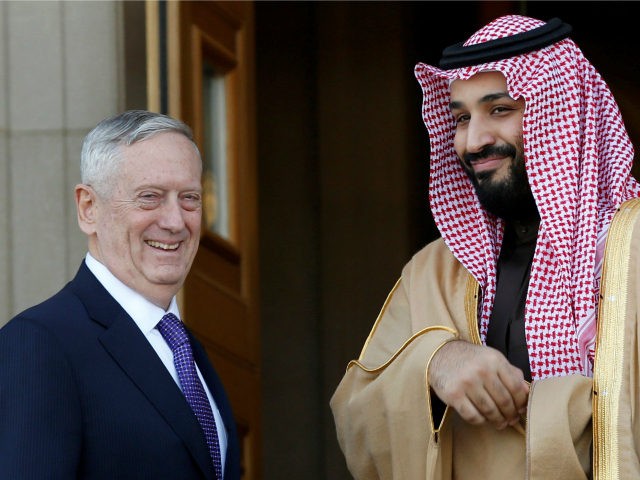Saudi Deputy Crown Prince Mohammed bin Salman met with Secretary of Defense James Mattis on Thursday following what the Saudi government proclaimed to be a successful meeting with President Donald Trump. The two reportedly discussed tensions in the Middle East with a focus on “confronting Iran’s destabilizing regional activities.”
According to Gulf news network al-Arabiya, Salman and Mattis held a closed-door discussion for “over three hours” and created an “atmosphere of consensus” regarding the Islamist threats facing both countries in the region. The Pentagon statement confirmed that containing the influence of Iran – whose terror proxies are playing major roles in conflicts in Syria, Iraq, and Yemen – took up much of their conversation.
The prince, who also serves as Saudi Arabia’s defense minister, told reporters, “Saudi Arabia is ready to send its troops to Syria as the country would do all it takes to eradicate terrorism,” according to al-Arabiya. The network adds that Mattis and Salman were joined by “Chairman of the Joint Chiefs of Staff Joseph Dunford, the National Security Adviser H.R. McMaster, the President’s senior counselor for economic initiatives Dina Powel, the White House chief strategist Steve Bannon, and senior defense and foreign ministry officials.”
The conversation followed a meeting with President Trump Wednesday, after which a spokesman for the prince issued a glowing statement of the U.S. president. “Prince Mohammed considers his Excellency [Trump] as a true friend of Muslims who will serve the Muslim World in an unimaginable manner,” the statement read in part, “opposite to the negative portrait of his Excellency [Trump] that some have tried to promote.” The prince also appeared to support President Trump’s plans to build a wall on the American southern border: “Both sides discussed the Saudi successful experience in building a fence on the Saudi-Iraqi border, which led to preventing illegal entrance of individuals, as well as preventing smuggling operations.”
The prince also appeared to support President Trump’s plans to build a wall on the American southern border: “Both sides discussed the Saudi successful experience in building a fence on the Saudi-Iraqi border, which led to preventing illegal entrance of individuals, as well as preventing smuggling operations.”
Mohammed bin Salman’s meeting with President Trump occurred as King Salman attended scheduled meetings with senior Communist Party officials in China, seeking further investment into the Saudi economy.
The emphasis on containing Iran highlights Saudi tensions with the largest Shiite Muslim country in the world, which it regularly accuses of playing a key role in exporting terrorism worldwide. Saudi Arabia itself has a checked history of exporting Wahhabism, an extremist strain of jihadist Islam, and Saudi government officials have been implicated in some of the deadliest terrorist attacks in the world.
Saudi Arabia is currently seeking to overturn a law that allows the victims of the September 11, 2001, terror attacks to sue the kingdom for damages, citing al-Qaeda’s communications with Saudi government officials.
Iran’s Foreign Ministry has taken the opportunity of the meeting between Mattis and the prince to condemn Saudi Arabia once again, calling his visit to Washington “deluded and fallacious” and accusing Saudi Arabia of war crimes. Mohammed bin Salman, Foreign Ministry spokesman Bahram Qassemi said, was “one of the main directors of the Saudi war on the innocent and defenseless Yemeni nation, and the manifestation of terror and horror in Syria, Bahrain and other regional and world countries.”
“The history of the Middle East will teach all, especially petrodollar-dependent states who have through the fantasy and illusion [of being able] to buy security moved to offer a green light to the intervention of foreign players, that they are making a huge mistake because previous interventions by trans-regional powers have only led to insecurity in countries and the states that have summoned the foreign powers,” Qassemi warned.

COMMENTS
Please let us know if you're having issues with commenting.